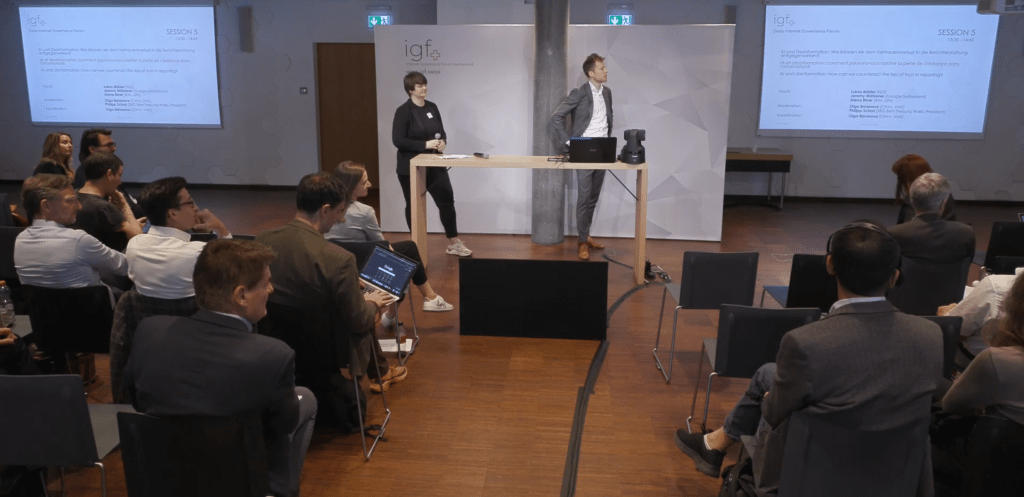Digital for Planet has been invited to attend the Swiss Internet Governance Forum 2024, on June 5 in Bern, Switzerland and our perspectives contributed to the success of the Session 5: AI and disinformation: how can we counteract the loss of trust in reporting?
Session 5 identified that authenticating sources/authorship is more important than labeling AI-generated content as such. The challenge lies not only with the media and platforms (the supply side), but also with the consumers of the AI-generated content (the demand side): media, news, and general digital literacy are central factors for broader public trust in the digital content, and need promotion. Digital for PLanet has recently published on the digital literacy as an important factor to lessen and eradicate the digital divide here. D4P is also part of an important Consortium INPACE (funded by European Union’s Horizon Europe Research and Innovation Programme and the Swiss State Secretariat for Education, Research and Innovation (SERI)) dealing with, among others, digital skills and trustworthy AI.

Positive (not just deterrent) examples are especially needed to demonstrate how reliable online information sources can be identified. Regarding the moderator role of internet platforms, legal certainty is needed. Additionally, research and smaller actors (SMEs, NGOs, etc.) urgently need access to data for more and better studies on disinformation to make the debate more objective and to prevent general insecurity among the population, e.g., due to overly sensational media coverage of deepfakes.
The last points of the session (i.e., legal certainty, as well as legal liability regarding the AI-generated content and its sources/authors, especially in the case of disinformation; and clear, harmonized and publicly accessible guidelines on the limits and opportunities of using AI, including in research) were underlined and developed, including, from the sustainability angle, by Dr. Anna Aseeva ( Sustainability expert at Digital for Planet) during her intervention at the panel. The innovative technologies, including AI, beyond being ‘green by design’ (digital environmental sustainability), should equally be economically and socially sustainable–by being accessible, thus bridging the digital divide, as well as trustworthy, secure and liable, thus minimizing general insecurity of users.
Indeed, to achieve truly sustainable AI, it is essential to holistically address not only AI’s environmental footprint, but also, and especially, the systemic, broader sustainability risks. By considering all aspects of sustainability, we can strive to ensure that AI development and deployment minimize its negative impact on our society across multiple dimensions. This comprehensive approach acknowledges the interconnectedness of various resources and the need to manage them collectively and sustainably.
All countries should participate in international AI governance to harmonize approaches for various AI contexts and applications. Best international practices could come from different national and regional (EU) laws and regulations. Defining human control points contextually and identifying necessary resources is crucial. Specialized expertise and a comprehensive view of the entire tech stack are essential for a trustworthy, safe, secure, and human-centred AI.
Public-private partnerships are key for sharing knowledge and skills beyond organizational boundaries. Compliance with certificates, standards, and legal requirements improves security but doesn’t guarantee it. Continuous improvement and resilience are necessary, alongside public education on digital literacy–specifically, on cyber threats to enhance general cybersecurity.
By the end of 2024, Switzerland will review the prospective AI regulatory approaches, considering international developments and identifying regulatory gaps. Opinions differ on sectoral versus horizontal regulation. Direct transposition of the EU AI Act into Swiss law is rejected. “Sandboxing” for experimental purposes is supported. Discussions include employee protection, copyright issues, and technical implementation.
Digital technologies can bring efficiency gains, but focus should also be on material improvements. The growing electricity demand from data centres requires accounting for rebound effects and ecological costs. A framework for human-centred, environmentally friendly innovation is needed. Digital sufficiency means using technologies strategically for added value and being willing to say “No” when necessary.
Recommendations include replicating the government’s action model for medical personnel to digital skills, focusing on senior executives, financing continuing education, accelerating state digitization, and relying on existing institutions for lifelong learning.
Governance of data spaces must ensure data availability, especially for less empowered actors (i.e. outside the Bg Tech type of entities, such as SMEs, NGOs, etc.) and secondary use while addressing privacy concerns and protecting intellectual property. Conformity with European and international data standards is essential for sustainable economic and societal benefits.
The Swiss E-ID improves security and efficiency but raises privacy concerns, especially with 3D video facial recordings. Social credit systems are incompatible with Swiss values, and increasing state surveillance poses risks to freedom and privacy. The state often rejects modern encryption to leave surveillance loopholes.
Digital for Planet - D4P © 2025 | All rights reserved